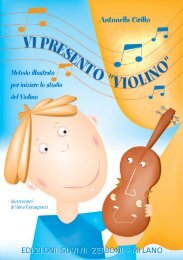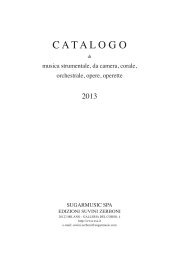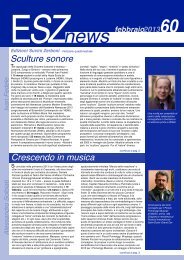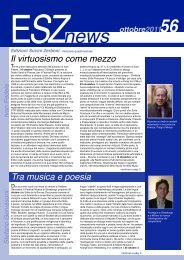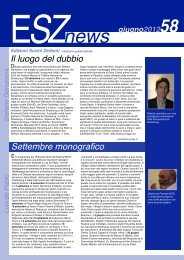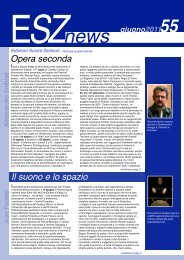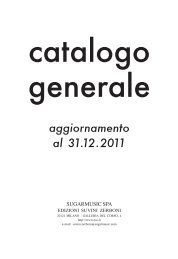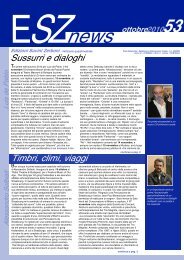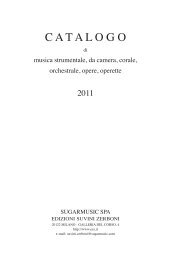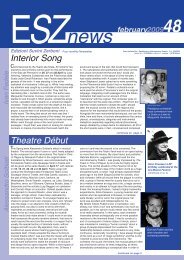Timbral Spaces Sound Labyrinths - Edizioni Suvini Zerboni
Timbral Spaces Sound Labyrinths - Edizioni Suvini Zerboni
Timbral Spaces Sound Labyrinths - Edizioni Suvini Zerboni
You also want an ePaper? Increase the reach of your titles
YUMPU automatically turns print PDFs into web optimized ePapers that Google loves.
from page 1 (Cattaneo: <strong>Sound</strong> <strong>Labyrinths</strong>)<br />
Blut for trio (saxophone, percussion and piano) and<br />
orchestra, played by the Trio Accanto and the SWR<br />
Sinfonie Orchester Baden-Baden und Freiburg directed<br />
by François-Xavier Roth. The composer explains his<br />
new work: «Blut: blood that runs in the veins… a red<br />
thread that leads us inside the labyrinth... a note that<br />
runs all through the piece, a red thread that binds the<br />
structure… a liquid that takes on shape when forced<br />
into a container… material that takes on shape when<br />
placed in a structure… Three soloists, an orchestra.<br />
Intertwined dialogues. Music for orchestra that dissolves<br />
into chamber music. Chamber music that opens itself to<br />
the orchestra. Echoed instruments, echoes of<br />
instruments». On January 15 in the Studio Ernest<br />
Ansermet of the Radio de la Suisse Romande in<br />
Geneva the Saison Contrechamps will include Parole di<br />
settembre - Libro I for countertenor and ensemble on<br />
texts by Edoardo Sanguineti, commissioned by the<br />
same institution and performed by Daniel Gloger and<br />
the Ensemble Contrechamps directed by Michael<br />
Wendeberg. The concert will also include Sabbia for<br />
eleven instruments. Parole di settembre takes its<br />
inspiration from the cycle of fifteen poems dedicated in<br />
2006 by Edoardo Sanguineti to Andrea Mantegna, to<br />
mark the 5 th centenary of the artist’s death. A friend of<br />
the poet, with whom he had already collaborated,<br />
Cattaneo obtained his permission, shortly before<br />
Sanguineti’s death in May 2010, to set the poems to<br />
music. The vocal parts of this three-part cycle, of<br />
variable instrumentation, were written for Claron<br />
McFadden (soprano), Otto Katzameier (baritone) and<br />
Daniel Gloger (countertenor). The single parts of the<br />
cycle are linked by madrigal/frottola-like passages sung<br />
unaccompanied by the three soloists. At the heart of the<br />
poems lie twelve paintings by Mantegna to which<br />
Sanguineti refers, explicitly or in allusive terms.<br />
Cattaneo offers a more precise account: «In September<br />
2006, to mark the 5 th centenary of the death of Andrea<br />
Mantegna, an extensive exhibition was organized in<br />
Mantua, Padua and Verona. For the opening of the<br />
exhibition an event was organized in Piazza delle Erbe<br />
in Mantua for which Edoardo Sanguineti wrote a cycle<br />
of poems inspired by Mantegna’s paintings. During the<br />
Niccolò Castiglioni<br />
The 21 st edition of the Festival di Milano Musica,<br />
Percorsi di Musica d’Oggi 2012, will pay<br />
homage to Niccolò Castiglioni. The<br />
composer from Milan, who died<br />
prematurely in 1996, was a pupil of<br />
Ghedini and the Ferienkurse in<br />
Darmstadt, a teacher in the USA, Trento<br />
and Milan, and much appreciated by<br />
Ligeti, is attracting an ever-increasing<br />
amount of interest. The series of six<br />
concerts will feature top-class artists and<br />
will be held at prestigious venues<br />
throughout the city. On October 7 the<br />
opening concert will be held at the Teatro<br />
alla Scala and will include Tropi for<br />
chamber group, played by the Scharoun Ensemble<br />
Paolo Arcà<br />
The label VDM Records (VDM 038-55-022) has<br />
released the monographic Cd Spiel dedicated to Paolo<br />
Arcà, with the Contempoartensemble, directed by<br />
Mauro Ceccanti. The programme offers a chamber<br />
portrait of the composer, focusing on works written in<br />
spectacle Sanguineti recited his book of poems while<br />
I made a sound installation and the artist Marco Nereo<br />
Rotelli projected luminous images onto the medieval<br />
buildings of the square. Shortly afterwards I thought that<br />
Sanguineti’s text would be perfect for a large vocal cycle<br />
and I spoke about it to him, who was very happy. Then,<br />
for various reasons, the idea was set aside until our last<br />
meeting in Madrid in April 2010. After that I had no other<br />
chance to talk to him about it: Edoardo passed away<br />
and so I decided to continue the dialogue, now at a<br />
distance, by starting to work on these Parole di<br />
settembre. After much thought I decided to divide<br />
Parole di settembre into three parts. The complete work<br />
will last around an hour. In order to reflect the great<br />
variety of moods, registers and languages used by<br />
Sanguineti, this being a very important characteristic of<br />
his poetry, I thought of a structure that exploits the<br />
possibilities of the vocal and instrumental combinations<br />
to the maximum. In fact in Books I and III, the ensemble<br />
won’t be used altogether, but there will also be pieces<br />
featuring different combinations. The difficult thing about<br />
a work of this length is maintaining the tension and the<br />
direction, and at the same time a sense of unity. The<br />
choice of texts isn’t yet definitive. I’ll use all fifteen<br />
poems, some in their entirety, others only partially. The<br />
introductory madrigal and the final one will make use of<br />
the introduction and closing of the book. For the<br />
moment I’ve chosen 12 pieces for sure. Perhaps Book II<br />
will involve a visual installation by Alexander Arotin».<br />
The first complete performance of the three books of<br />
Parole di Settembre is scheduled for February 18 2014<br />
at the Konzerthaus in Vienna with the above-mentioned<br />
soloists and the Klangforum Wien. On October 1 st at<br />
the Helsinki Music, during the festival “Klang”, the Trio<br />
III for violin, viola, cello and electronics was performed<br />
by the Soloists of the Tapiola Sinfonietta. The Trio IV for<br />
clarinet, cello and piano can be heard on October 6 at<br />
the Akademie der Künste in Berlin, with the Ensemble<br />
Mosaik, and again on January 1 st 2013 at the<br />
Kestnergesellschaft in Hanover, with the Neue<br />
Ensemble, who will also play Visibile for piccolo and<br />
Seeds for flute, clarinet, violin, cello and piano.<br />
Berlin under Andrea Pestalozza. On October 17<br />
Massimiliano Damerini will play Cangianti for<br />
piano in the Auditorium San Fedele. On<br />
October 19 Attraverso lo specchio, a radio<br />
opera in one act on a libretto by Alberto Ca’<br />
Zorzi Noventa will be broadcast in the Spazio<br />
Sirin, in the monophonic recording of the<br />
Archivio dello Studio di Fonologia Musicale della<br />
Rai in Milan. The event will be presented by<br />
Angela Ida De Benedictis and Carlo Piccardi.<br />
On October 24 at the Sala Puccini of the<br />
Conservatorio “G. Verdi” Gymel for flute and<br />
piano will be played by the soloists of the<br />
Laboratorio di Musica Contemporanea of the<br />
Conservatory.<br />
the space of 25 years (1987-2002), and includes Light<br />
Fantasy for violin and piano, Notturno a tre for flute,<br />
cello and piano, Spiel for clarinet and string quartet,<br />
Passacaglia per Giuseppe for nine instruments and<br />
Skool for piano and quintet.<br />
Luca Mosca<br />
The Quintetto for flute, clarinet,<br />
violin, cello and piano will be<br />
played by the Mdi Ensemble,<br />
on October 31 in the Auditorium<br />
San Fedele in Milan, during the<br />
Milano Musica Festival.<br />
3



